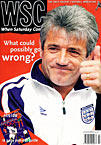 The Heysel disaster should be a reminder of the potential dangers ahead at Euro 2000
The Heysel disaster should be a reminder of the potential dangers ahead at Euro 2000
On May 29, the city of Liverpool formally marked the anniversary of the Heysel disaster for the first time, 15 years after it occurred. If anyone needed any further reminders of the worst that can happen at big international football events, the timing could not have been better.
After football-related violence has broken out, whether it is relatively trivial or catastrophic, there is never any shortage of people willing to apportion blame even when there is rarely one single cause. Contributory factors include: the numbers of fans eager, willing or prepared to fight; alcohol; tensions between particular countries or clubs; stadium design and organisation; policing; luck. When enough of the ingredients combine in the wrong proportions, the results can look like Heysel.
We would hardly be alone in looking apprehensively at the circumstances surrounding Euro 2000. “Is it too much to ask that everything is done to frustrate the hooligans?” asked an FA spokesman plaintively when requesting the government to withdraw the passports of known troublemakers before Euro 2000. “As we know the names of those likely to cause trouble, we must take action now.”
It is possible to sympathise with the FA’s view, but trying to prevent people from travelling has rarely been an effective means of controlling the problem. What’s more, it’s hard to argue for an idea that Jack Straw thinks is too draconian or unworkable. Good police liaison, modern stadiums and restrictions on alcohol sales are more likely to be successful in limiting the seriousness of any trouble. In this respect, it has to be said that the Belgian authorities in particular do not inspire confidence.
Some of the complaints about Charleroi have been condescending, or simply inaccurate. (For example, descriptions of the town as “tiny” – it’s about the same size as Newcastle.) But the fact that safety concerns about the stadium are being expressed at this late stage give cause for legitimate concern that Heysel has been only half-remembered in Belgium as well as England.
If things go horribly wrong at Euro 2000, the organisers have certainly left themselves open to criticism. But as ever, it is not hard to predict which fans are likely to be at the centre of any trouble. As our guide to the competing countries in this issue shows, few people believe there are likely to be serious problems with fans from anywhere except England, Germany and Turkey.
Changing the culture of travelling England fans is a much bigger ask than choosing the right stadium for a big game. Thirty years of trouble abroad has cemented in the minds of opposing fans and police forces that the English are there to fight. It has also created a sense of pride among some fans about our “fighting tradition” and paranoia among others about the reactions of foreigners to groups of drunk English males.
So far, so familiar. But there is one new element which makes Euro 2000 slightly more unpredictable than other recent tournaments, namely the 2006 World Cup bid. Unlike the government of 15 years ago, New Labour is so eager to cash in on football’s popularity that Tony Banks has seen fit to criticise what he deemed to be excessive reporting of the violence at the UEFA Cup final in Copenhagen.
The government’s position also partly affects how the papers line up on hooliganism. The hysterical calls by the Daily Mail to withdraw the 2006 bid are surely motivated largely by their antipathy to Labour. The Sun’s position seems more confusing. While indulging in the usual shameless prurience (“Brutes Shame Soccer Again… Battle of Copenhagen pages 2-5”), its relationship with the government and with 2006 is more ambiguous. The Murdoch media would surely prefer the tournament to be here under normal circumstances.
Yet they are happier for the politicians to take a pasting over violence that afflicts the national team, than for the increasingly worrying incidents that have surrounded the club game this season to be extensively reported; while England games are a bonus for the newspapers and their television associates, club football is their lifeblood.
There is good reason to be afraid of what might take place in the next month. Let’s hope those fears prove unfounded. But if the worst happens, the most predictable response of all will be a flood of instant solutions from people with axes to grind. That, at least, hasn’t changed since Heysel.
From WSC 161 July 2000. What was happening this month